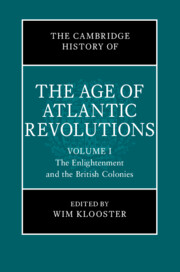Book contents
- The Cambridge History of the Age of Atlantic Revolutions
- The Cambridge History of the Age of Atlantic Revolutions
- The Cambridge History of the Age of Atlantic Revolutions
- Copyright page
- Contents
- Figures
- Maps
- Contributors to Volume i
- Preface
- Introduction
- Part I Enlightenment and Culture
- Part II The British Colonies
- 5 The Revolution in British America: General Overview
- 6 The Myth of “Salutary Neglect”: Empire and Revolution in the Long Eighteenth Century
- 7 The British Atlantic on the Eve of American Independence
- 8 Cities and Citizenship in Revolution
- 9 The Other British Colonies
- 10 The Participation of France and Spain
- 11 Britain, Ireland, and the American Revolution, c. 1763–1785
- 12 A Contest of Wills: The Spectrum and Experience of Political Violence in the American Revolution
- 13 Recovering Loyalism: Opposition to the American Revolution as a Good Idea
- 14 White Women and the American Revolution
- 15 Blacks in the British Colonies
- 16 Life, Land, and Liberty: The Native Americans’ Revolution
- 17 Shaping the Constitution
- 18 Reform and Rebellion in Spanish America at the Time of the American Revolution
- 19 International Warfare and the Non-British Caribbean
- 20 Interpreting a Symbol of Progress and Regression: European Views of America’s Revolution and Early Republic, 1780–1790
- Index
13 - Recovering Loyalism: Opposition to the American Revolution as a Good Idea
from Part II - The British Colonies
Published online by Cambridge University Press: 20 October 2023
- The Cambridge History of the Age of Atlantic Revolutions
- The Cambridge History of the Age of Atlantic Revolutions
- The Cambridge History of the Age of Atlantic Revolutions
- Copyright page
- Contents
- Figures
- Maps
- Contributors to Volume i
- Preface
- Introduction
- Part I Enlightenment and Culture
- Part II The British Colonies
- 5 The Revolution in British America: General Overview
- 6 The Myth of “Salutary Neglect”: Empire and Revolution in the Long Eighteenth Century
- 7 The British Atlantic on the Eve of American Independence
- 8 Cities and Citizenship in Revolution
- 9 The Other British Colonies
- 10 The Participation of France and Spain
- 11 Britain, Ireland, and the American Revolution, c. 1763–1785
- 12 A Contest of Wills: The Spectrum and Experience of Political Violence in the American Revolution
- 13 Recovering Loyalism: Opposition to the American Revolution as a Good Idea
- 14 White Women and the American Revolution
- 15 Blacks in the British Colonies
- 16 Life, Land, and Liberty: The Native Americans’ Revolution
- 17 Shaping the Constitution
- 18 Reform and Rebellion in Spanish America at the Time of the American Revolution
- 19 International Warfare and the Non-British Caribbean
- 20 Interpreting a Symbol of Progress and Regression: European Views of America’s Revolution and Early Republic, 1780–1790
- Index
Summary
Loyalists, those who opposed the rebellion that created the United States, remain poorly understood in large part because of the teleological implications of framing the American Revolution as the inaugurating event of the Age of Atlantic Revolutions. This essay shows loyalists as reasonable people who carefully assessed the specific colonial circumstances where each lived. The trajectory of three individuals, in particular, highlights the diversity of loyalism and that it drew support from all corners of colonial society. These three are the Mohawk diplomat Mary Brant, the slave-owning Georgia soldier William Martin Johnson, and the formerly enslaved Thomas Peters, who served with the British Army for the duration of the war. All three left the United States due to their ardent loyalism, dying, respectively, in Upper Canada, Jamaica, and Sierra Leone. Prioritizing loyalists highlights the violence of the rebel movement and showcases the War of American Independence as a civil war. In place of a familiar patriot and US-nationalist interpretation, recovering loyalism as a good idea emphasizes loyalists in their colonial context, assesses the transformative impact of war, and follows their diaspora throughout the British Atlantic and, especially, to British North America.
Keywords
- Type
- Chapter
- Information
- The Cambridge History of the Age of Atlantic Revolutions , pp. 344 - 372Publisher: Cambridge University PressPrint publication year: 2023

